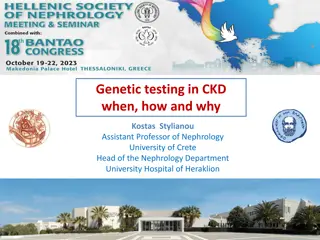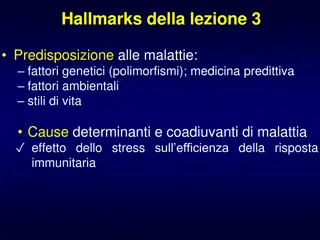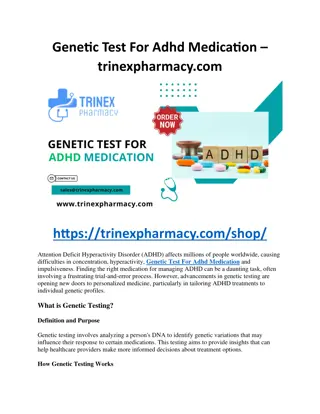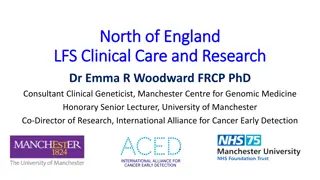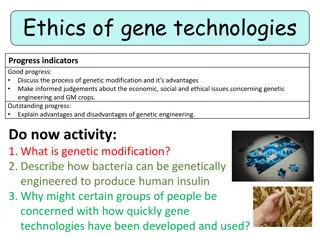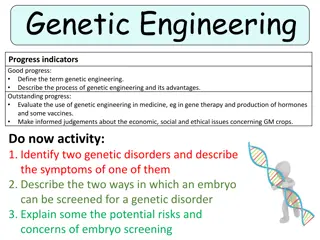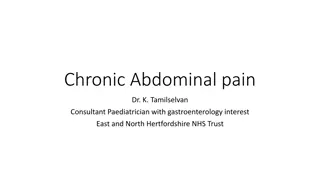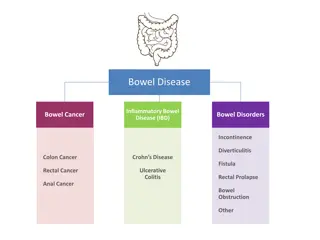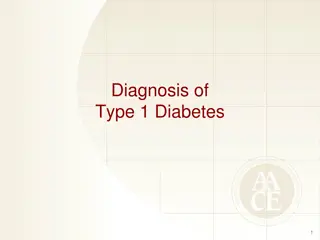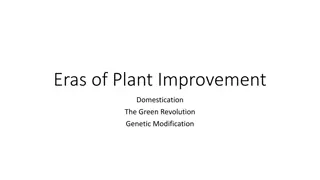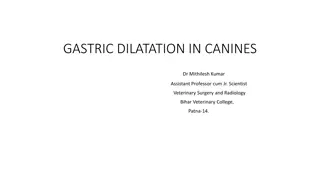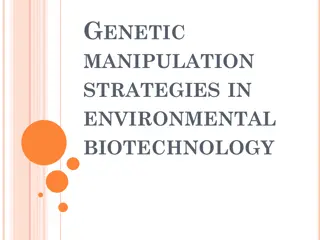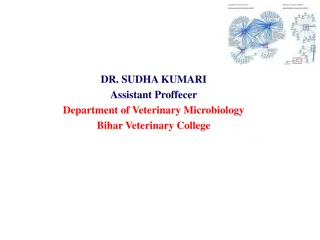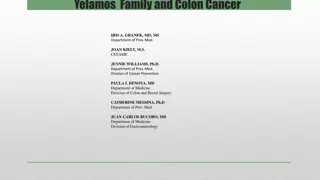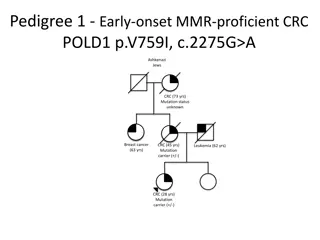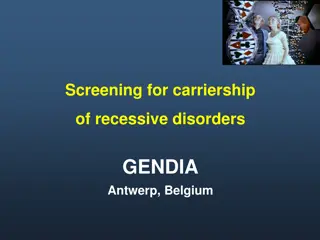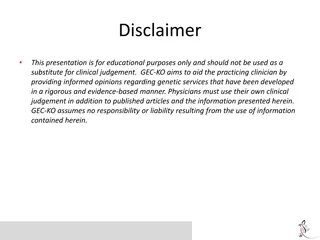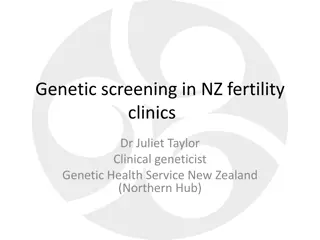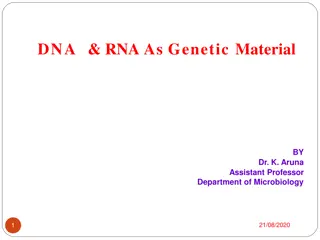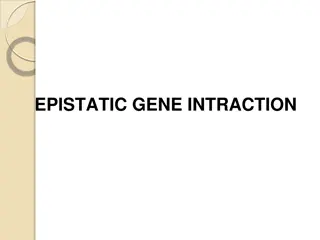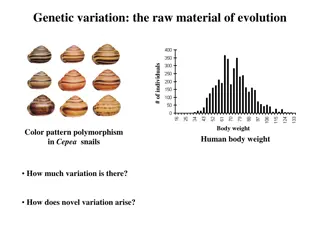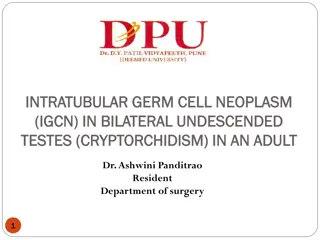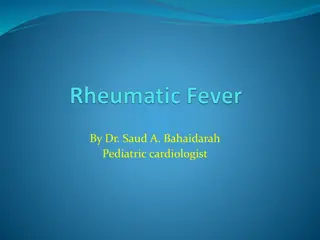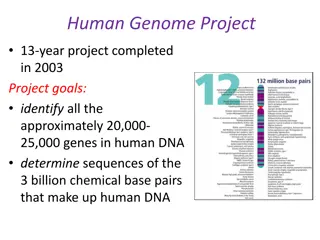Genetic Testing in Chronic Kidney Disease (CKD): Insights and Applications
Genetic testing plays a crucial role in identifying inherited kidney diseases, with around 15% of CKD cases having monogenic causes. Despite a high percentage of patients reporting a family history of CKD, Mendelian causes only account for about 10% of adult ESRD cases. Understanding the genetic bas
1 views • 52 slides
Understanding Cellular Pathology: Response to Stress and Disease Predisposition
Explore the hallmarks of cellular pathology, including factors influencing disease predisposition such as genetics, environmental factors, and lifestyle. Delve into the cellular response to stress, adaptive and pathological reactions, and key stressors disrupting cellular homeostasis. Uncover how ce
0 views • 51 slides
International Treaty on Plant Genetic Resources for Food and Agriculture
The presentation to the select committee on Land, Environment, Mineral Resources, and Energy focuses on the importance of plant genetic resources for food and agriculture (PGRFA) in ensuring sustainable agricultural production and food security. It highlights the significance of conserving and utili
1 views • 25 slides
Genetic Test for Adhd Medication - trinexpharmacy.com
Attention Deficit Hyperactivity Disorder (ADHD) affects millions of people worldwide, causing difficulties in concentration, hyperactivity, Genetic Test For Adhd Medication and impulsiveness. Finding the right medication for managing ADHD can be a daunting task, often involving a frustrating trial-a
1 views • 6 slides
Role of Consultant Clinical Geneticist in Hereditary Cancer Predisposition
Consultant Clinical Geneticists play a crucial role in assessing the risk of high-risk hereditary cancer predisposition, implementing prevention strategies, and early detection through methods like Whole Body MRI. Surveillance involves annual examinations, imaging, and expert coordination between cl
0 views • 12 slides
Exploring the Pros and Cons of Genetic Engineering
Delve into the world of genetic modification, uncovering its advantages such as potential breakthroughs in treating inherited disorders and improved crop quality. However, concerns include unknown long-term health impacts, environmental risks, and ethical dilemmas. Engage with various viewpoints thr
0 views • 11 slides
Overview of Human Genetic Disorders
Human genetic disorders encompass a range of conditions, from recessive disorders like cystic fibrosis to dominant disorders such as Huntington's disease. Examples include cystic fibrosis, Huntington's disease, and sickle-cell anemia. Understanding genetic disorders involves research and awareness o
0 views • 10 slides
Understanding Hypertension: Types, Pathogenesis, and Management
The article discusses the physiological basis, types, pathogenesis, and genetic predisposition of hypertension. It explains the revision of terminology related to blood pressure and the calculation of mean arterial pressure. Secondary hypertension, causes, and mean arterial pressure determination ar
0 views • 29 slides
Exploring Genetic Engineering: From Basics to Applications
Genetic engineering involves altering the genetic material of organisms to achieve desirable traits. This process entails cutting out specific genes from one organism and transferring them to another. In medicine, genetic engineering finds applications in gene therapy, hormone production, and vaccin
0 views • 12 slides
Understanding Genetic Markers in Molecular Mapping
Genetic markers play a crucial role in gene mapping within molecular biotechnology. They are fragments of DNA associated with specific genomic locations, aiding in identifying DNA sequences and analyzing genetic variation. Various types of genetic markers such as RFLP, SSR, and SNP offer insights in
1 views • 26 slides
Understanding Genetics: Mutations, Chromosomal Aberrations, and Genetic Engineering
Genetic mutations can be harmless, harmful, or beneficial, leading to variations within a species. Examples of gene mutations and chromosomal aberrations, like Trisomy 21, illustrate genetic abnormalities. The increase in Down Syndrome cases with maternal age highlights a maternal age effect. Geneti
0 views • 17 slides
Understanding Chronic Abdominal Pain in Children: Causes, Diagnosis, and Treatment
Chronic abdominal pain in children is a common issue, with underlying organic diseases being relatively uncommon. Factors such as stress, parental anxiety, and genetic predisposition can contribute to these symptoms. It is crucial to differentiate between functional and organic GI disorders through
1 views • 28 slides
Understanding Bowel Diseases and Their Management
Understanding the causes and mechanisms of bowel diseases such as inflammatory bowel disease (IBD), bowel cancer, diverticulitis, Crohn's disease, and more is crucial for effective treatment. Genetic predisposition, environmental factors, immune malfunction, age-related issues, and lifestyle choices
0 views • 5 slides
Exploring Genetic Engineering: A Journey into Manipulating Organisms
Delve into the world of genetic engineering, where organisms' genetic makeup is altered for various purposes. Discover the process of modification, the history of genetic manipulation, and the impact of genetically modified organisms on society and science.
0 views • 20 slides
Improving Microbial Productivity and Characteristics for Industrial Applications
Efforts to enhance the productivity of natural isolates for commercial products involve genetic modifications through mutation, genetic recombination, and genetic engineering techniques. Desired characteristics include genetic stability, efficient production, versatility in carbon sources, and ease
1 views • 25 slides
Classification and Genetic Defects of Diabetes
The diagnosis and differential diagnosis of Type 1 and Type 2 diabetes are discussed, detailing the clinical courses, age of onset, body weight characteristics, onset patterns, and genetic factors. The etiologic classification of diabetes including insulin-deficient, immune-mediated, monogenic, and
0 views • 16 slides
Evolution of Plant Improvement: Domestication to Genetic Modification
Plant improvement has evolved through different eras - from ancient domestication to the Green Revolution and genetic modification. Domestication shaped major crops over millennia, the Green Revolution introduced high-yielding varieties, and genetic modification allows direct genetic alterations for
0 views • 6 slides
Understanding Gastric Dilatation in Canines: Causes, Symptoms, and Treatment
Gastric Dilatation and Volvulus (GDV) syndrome, commonly known as bloat, is a serious condition in dogs where the stomach dilates and twists, leading to life-threatening consequences. Large breeds, especially deep-chested dogs, are more prone to GDV. The exact cause of GDV is unknown, but factors li
0 views • 27 slides
Genetic Manipulation in Environmental Biotechnology
Genetic manipulation strategies in environmental biotechnology involve techniques like gene splicing and molecular cloning to modify genes directly. These methods have various applications such as isolating genes, producing specific molecules, improving biochemical production, creating organisms wit
0 views • 20 slides
Understanding Bacterial Transformation in Molecular Biology
Transformation in molecular biology is a process where genetic material is altered by the uptake of exogenous DNA. It involves the direct incorporation of genetic material into a cell, leading to genetic changes. This phenomenon was first demonstrated by Frederick Griffith in 1928. The process of tr
1 views • 25 slides
Understanding Genetic Counselors and the NSGC
Genetic counselors play vital roles in healthcare by assisting patients with genetic conditions, advocating for their needs, educating providers, conducting research, and influencing public policy. The National Society of Genetic Counselors (NSGC) supports genetic counselors in their professional en
3 views • 12 slides
Yelamos Family and Colon Cancer Research Overview
The Yelamos Family, immigrants from Guatemala, unknowingly carry a genetic mutation putting them at high risk for colon cancer. This research delves into the impact of genetic predisposition and lifestyle changes on their health. The proposed family visit to a medical school aims to educate and rais
0 views • 13 slides
Familial Colorectal Cancer Syndromes: Genetic Profiles and Clinical Presentations
These pedigrees depict familial colorectal cancer syndromes in Ashkenazi and Iraqi Jews, showcasing early-onset MMR-proficient CRC cases linked to mutations in POLD1 and POLE genes. The pedigrees detail various cancer diagnoses, mutation carrier statuses, and ages of onset across multiple generation
0 views • 5 slides
Genetic Carrier Screening for Recessive Disorders by GENDIA, Antwerp, Belgium
Explore the world of genetic carrier screening offered by GENDIA in Antwerp, Belgium. Learn about prenatal screening for various genetic disorders, including Down syndrome and severe monogenic disorders. Discover the frequency of common recessive disorders and the severity of genetic diseases. Uncov
0 views • 17 slides
Exploring Expanded Carrier Screening in Family Planning
Learn about expanded carrier screening as a tool for identifying genetic risks in family planning scenarios. Understand the importance of genetic testing, considerations for non-consanguineous couples like Julie and Chris, and the evolving landscape of genetic services. Explore key aspects such as f
1 views • 36 slides
Genetic Screening and Reproductive Carrier Testing in New Zealand Fertility Clinics
Genetic screening and reproductive carrier testing play crucial roles in identifying and managing genetic disorders in couples planning for pregnancy. While carrier screening is recommended for all couples, it is not widely followed in New Zealand. Pre-conceptual reproductive carrier screening is no
0 views • 19 slides
Understanding Direct-to-Consumer Genetic Testing: Cases and Considerations
Explore real-life scenarios of individuals opting for Direct-to-Consumer Genetic Testing (DTC-GT) to assess genetic risk for various health conditions. Consider the implications, limitations, and cautions associated with DTC-GT, highlighting the importance of comprehensive evaluation and genetic cou
0 views • 39 slides
Understanding Genetic Disorders and Their Impact on Health
Genetic disorders are caused by abnormalities in genes or chromosomes, leading to various health conditions. Inherited disorders can be passed down from parents to children, affecting physical makeup and processes in the body. In India, there is a high prevalence of genetic disorders, particularly i
1 views • 12 slides
Understanding DNA and RNA as Genetic Material
Genetic material plays a crucial role in the transmission of traits from one generation to the next. This article explores the significance of DNA and RNA as genetic material, highlighting key experiments and discoveries that demonstrate DNA's role in carrying hereditary information. From Mendel's h
0 views • 32 slides
Understanding the Key Articles of the Nagoya Protocol on Access to Genetic Resources and Benefit-Sharing
The Nagoya Protocol aims to promote fair sharing of benefits from genetic resources utilization for conservation efforts. It encompasses access, technology transfer, funding, and respect for rights over resources and technologies. The protocol applies to genetic resources, traditional knowledge, and
1 views • 19 slides
Understanding Epistasis: Genetic Interactions and Their Implications
Epistasis is a phenomenon where the phenotypic expression of one gene is influenced by interactions with another gene. This concept, first introduced in 1909, plays a crucial role in genetics, affecting various traits and evolutionary processes. The difference between dominance and epistasis lies in
0 views • 41 slides
Understanding Genetic Variation and Its Role in Evolution
Genetic variation is crucial for evolution, providing the raw material for adaptation and species diversity. Phenotypic variation can arise from differences in genotype, environment, or their interaction. Studying genetic variation through statistical analysis and at the molecular level helps us unr
0 views • 47 slides
Genetics II Jeopardy: Linked Genes, Genetic Mapping, and Sex Chromosomes
Explore the world of genetics with Genetics II Jeopardy, covering topics such as linked genes, genetic mapping, sex chromosomes, and inheritance patterns. Discover the significance of gene location on chromosomes, the concept of recombination frequency, and the role of specific genes like SRY in mal
0 views • 26 slides
Evolutionary Computation and Genetic Algorithms Overview
Explore the world of evolutionary computation and genetic algorithms through a presentation outlining the concepts of genetic algorithms, parallel genetic algorithms, genetic programming, evolution strategies, classifier systems, and evolution programming. Delve into scenarios in the forest where gi
0 views • 51 slides
Rare Case of Bilateral Undescended Testes with Intratubular Germ Cell Neoplasm in an Adult
A 35-year-old male presented with bilateral inguinal swelling and pain, revealing a rare case of synchronous bilateral intratubular germ cell neoplasm in bilateral undescended testes (cryptorchidism) in an adult. The pre-operative diagnosis was challenging due to the atypical tumor presentation. Ris
0 views • 25 slides
Rheumatic Fever: A Comprehensive Overview of Epidemiology, Pathogenesis, and Clinical Features
Rheumatic fever is a delayed autoimmune reaction to group A, B-hemolytic streptococcal pharyngitis in genetically susceptible individuals. This condition involves the heart, joints, brain, skin, and serous surfaces. The incidence varies between developing and developed countries, with environmental
0 views • 31 slides
Understanding Mental Health in Children: Factors and Concerns
Mental health in children is a critical aspect of their well-being. The World Health Organization defines mental health as a state of well-being where individuals can cope with life stresses and contribute positively to their community. Numerous factors, such as genetic predisposition, parental sepa
0 views • 9 slides
Understanding Genetic Disorders and the Human Genome Project
The Human Genome Project, completed in 2003, aimed to identify all human genes and DNA sequences. Genetic disorders, like autosomal disorders and Huntington's disease, can result from mutations at different levels, affecting single genes, chromosomes, or multiple genes. Albinism and cystic fibrosis
0 views • 37 slides
Exploring the Factors Behind Criminal Behavior
Understanding who commits crime and why certain individuals are more likely to engage in criminal activities involves exploring a range of social and biological factors. While biology suggests a genetic predisposition to criminal behavior, sociology emphasizes the influence of social factors like fa
0 views • 9 slides
Variability in Training Duration for Acquiring Absolute Pitch Ability
Sakakibara's study on acquiring absolute pitch ability revealed significant variability in the time taken by participants to pass pitch identification tests. Genetic predisposition may play a role, as differences were observed independent of factors like age, gender, and music experience. The study
0 views • 17 slides
